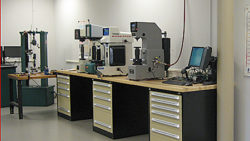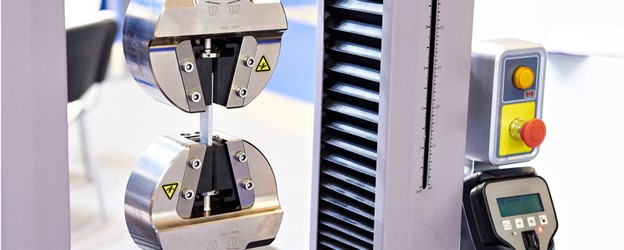Materials Test Lab Mastery: Unraveling High Quality with Professional Analysis
Wiki Article
Putting Products to the Test: Discovering the Function of Products Examination Labs
Products test labs play a vital duty in ensuring the high quality and integrity of different products used in sectors such as aerospace, construction, and production. These labs conduct strenuous screening to evaluate the efficiency, strength, resilience, and safety of products, enabling firms to make informed decisions regarding their usage in frameworks and products. Via a combination of sophisticated methods and specialized devices, materials examination labs are able to assess the homes of steels, polymers, composites, and various other products under different problems and stress factors. The results obtained from these examinations offer useful understandings right into product behavior, permitting designers and designers to optimize their items and processes. This write-up will explore the relevance of materials screening, the sorts of products tested, screening techniques and tools used, along with the applications of products test results. Furthermore, it will certainly review future fads in products testing, highlighting the continual innovations in this area.Value of Products Screening
Frequently analyzing the high quality of materials is critical in guaranteeing the integrity and security of items in numerous markets. This is where materials testing plays a vital role. Products testing involves subjecting products to various examinations and experiments to review their mechanical, physical, and chemical residential properties. By carrying out these providers, examinations and producers can make sure that their products satisfy the called for criteria and specifications.One of the essential reasons that materials testing is essential is the assurance of product top quality. With strenuous screening, manufacturers can identify any issues or weak points in the materials utilized for their items. This enables them to make essential enhancements to enhance the general high quality and efficiency of their items. Materials testing aids in recognizing prospective concerns that might arise throughout the product's lifecycle, such as wear and tear, corrosion, or architectural failures. By addressing these problems beforehand, suppliers can stop costly recalls, suits, and reputational damage.
By subjecting products to different tests, producers can determine their strength, resistance, and toughness to exterior factors such as warm, pressure, or chemicals. Whether it is vehicle parts, medical tools, or building materials, materials screening helps in recognizing any possible safety hazards and developing proper actions to minimize them.
Kinds Of Products Examined
Different types of materials are tested in materials examination laboratories to assess their mechanical, physical, and chemical homes. These products can encompass a variety of materials, consisting of steels, polymers, porcelains, compounds, and even natural materials such as wood and concrete.Metals are generally tested as a result of their widespread use in various sectors. These tests analyze residential or commercial properties such as tensile toughness, hardness, and ductility. Polymers, on the other hand, are tested to identify their elasticity, thermal security, and resistance to chemicals. Ceramics are taken a look at for their brittleness, resistance, and strength to high temperatures. Composites, which consist of two or even more various materials, are evaluated to comprehend their total performance, consisting of variables like toughness, resilience, and flexibility.
All-natural products like wood are checked to assess their strength, wetness material, and resistance to degeneration (materials test lab). Concrete is an additional typically checked material, with tests concentrating on its compressive strength, longevity, and resistance to ecological factors
Along with these products, materials examination laboratories also assess finishes, paints, adhesives, and different other products utilized in construction, manufacturing, and various other industries. By subjecting these products to strenuous testing, engineers and scientists can collect valuable data to educate product choice, design optimization, and quality control processes.
Evaluating Methods and Tools
Evaluating methods and devices play an essential duty in products examination labs for examining the mechanical, physical, and chemical residential properties of numerous materials. These techniques and equipment are crucial in guaranteeing the quality, reliability, and safety of products used in numerous sectors such as aerospace, vehicle, construction, and clinical.One frequently utilized testing method in products examination labs is mechanical screening, which entails subjecting materials to different forces or lots to identify their stamina, solidity, ductility, and other mechanical properties. This is usually done utilizing equipment such as universal screening devices, which can use tensile, compressive, and flexing pressures to test specimens.
Physical screening strategies are also used to examine properties such as density, viscosity, thermal conductivity, and electric conductivity. Equipment such as thickness meters, viscometers, thermal conductivity analyzers, and electrical conductivity meters are made use of to perform these tests accurately.
Chemical screening strategies are made use of to determine the chemical structure and pureness of products. Methods such as mass, spectroscopy, and chromatography spectrometry are typically utilized, in addition to specific tools developed for these objectives.

Applications of Products Test Results
The results of products testing provide beneficial understandings right into the performance and suitability of different products for certain applications in numerous markets - materials test lab. These test results play a critical duty in determining the quality, sturdiness, and safety of products used in producing proceduresAmong the essential applications of products examination results is in the field of construction. Engineers and architects depend on these results to select proper products for building structures, such as bridges, skyscrapers, and domestic buildings. By performing tests on products like wood, steel, and concrete, they can make sure that these materials meet the called for criteria and can endure various environmental conditions.
In the aerospace sector, materials examination results are go to this site essential in determining the viability of materials for airplane parts. By subjecting materials to extensive screening, designers can examine their mechanical homes, resistance to heat and corrosion, and capability to endure high-stress problems. This details is important in making certain the safety and security and dependability of airplane.

Future Fads in Materials Screening
In the world of materials screening, developments in materials checking methodologies are shaping the trajectory of the field, ushering in a brand-new era of innovation and precision. As innovation proceeds to progress, so does the demand for more advanced testing strategies and devices. One future fad in products testing is the assimilation of expert system (AI) and equipment knowing algorithms right into testing procedures. These technologies have the possible to improve the efficiency and precision of examination results by evaluating big amounts of data and identifying patterns that might not be quickly obvious by people. In addition, the usage of non-destructive screening approaches is coming to be increasingly prominent. These techniques permit for the examination of product residential or commercial properties without triggering damages or modification to the example, making them suitable for examining important or irreplaceable products. Furthermore, there is an expanding focus on sustainability in products screening. This includes the advancement of screening approaches that minimize waste and energy consumption, as well as the usage of environmentally-friendly materials in testing tools. In general, the future of materials testing is defined by continual technology and a commitment to boosting sustainability, precision, and efficiency.Verdict
Finally, materials testing plays a vital duty in various sectors by making sure the high quality, safety, and efficiency of materials used in frameworks and products. It entails evaluating a wide variety of products using numerous techniques and equipment to assess their mechanical, physical, and chemical homes. The results acquired from products testing are used to make enlightened choices in product production, choice, and layout processes. As modern technology advances, materials testing laboratories will continue to adapt and enhance their techniques to satisfy the evolving needs of markets.With a mix of innovative methods and customized tools, materials examination laboratories are able to examine the residential properties of metals, polymers, composites, and various other products under various problems and stress factors. By conducting tests on products like wood, concrete, and steel, they can guarantee that these products meet the called for requirements and can hold up against numerous environmental problems.
In the aerospace market, products examination outcomes you can find out more are crucial in establishing the suitability of materials for airplane parts. By evaluating materials for their versatility, resistance, and stamina to influence, producers can choose the most suitable materials for various vehicle elements, such as body panels, engine parts, and safety features.In the world of materials screening, improvements in materials checking techniques are shaping the trajectory of the area, ushering in a brand-new age of technology and precision.
Report this wiki page